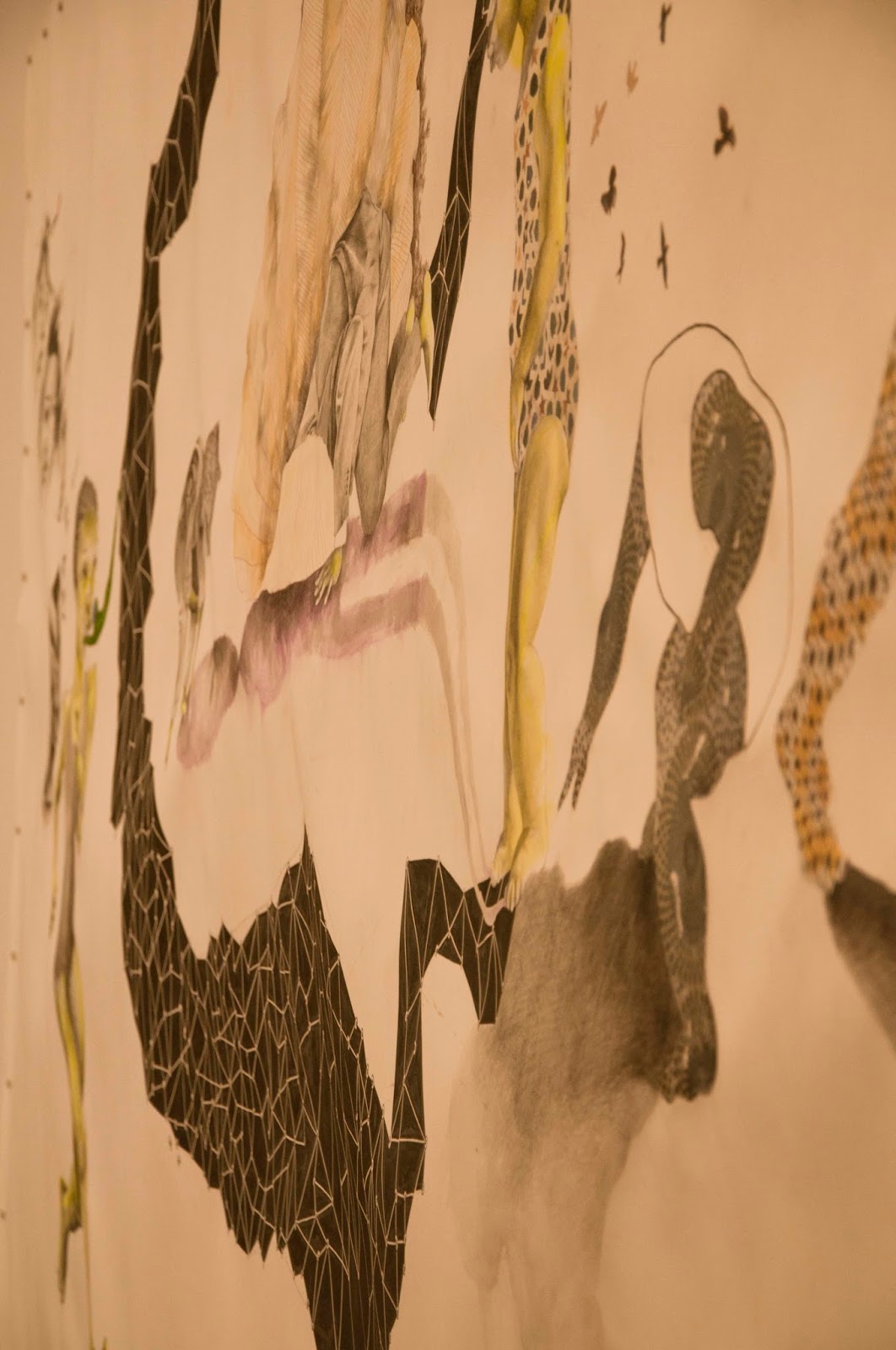 |
|
Ruby Onyinyechi Amanze, Chasing Relentlessly After Fading Things…, 2014
|
I Am!
By John Clare
I am—yet what I am none cares or knows;
My friends forsake me like a memory lost:
I am the self-consumer of my woes—
They rise and vanish in oblivious host,
Like shadows in love’s frenzied stifled throes
And yet I am, and live—like vapours tossed
Into the nothingness of scorn and noise,
Into the living sea of waking dreams,
Where there is neither sense of life or joys,
But the vast shipwreck of my life’s esteems;
Even the dearest that I loved the best
Are strange—nay, rather, stranger than the rest.
I long for scenes where man hath never trod
A place where woman never smiled or wept
There to abide with my Creator, God,
And sleep as I in childhood sweetly slept,
Untroubling and untroubled where I lie
The grass below—above the vaulted sky.
—
Analysis
This poem of John Clare’s is quite exquisite. It is and it is not and it says just so and explains just so. As is often the case, the complication and resolution of the poem reside in its title, which is the same words beginning the poem, “I Am!” What an exclamation! One hears a ringing forcefulness in this “I Am!” A seemingly defensive and insinuating fearful questioning of am I? It appears one never actually claims so forcefully “I Am!” when one indeed believes oneself to be and quite happily so. What then does it mean to make such an exclamation? The poem shows what its speaker means in three wonderfully rhythmic stanzas. In this analysis the focus is on how the stanzas differ and what these differing offer. From my perspective the stanzas seem to lighten from beginning to end. Hence the first stanza is the heaviest and most agonizing and the last is the lightest and calmest.
The first stanza of “I Am!” could be summarized as a consuming suffering of self. One that gulps the speaker in ways that feed it the urge to burst out saying “I Am!” What the first stanza does is translate what the speaker means by “I Am,” which is that which “none cares or knows” about; he is that which “friends forsake […] like a memory lost;” and also, a “self-consumer of […] woes.” Definitely not the sort one would ask to a cheerful afternoon tea party for his sorrowing would sink all attendees. The speaker seems as one who hungrily prowls his own company and relishes its bitternesses. The general tone of the first stanza, especially that of the first two lines, endorses an insinuation that the speaker would rather someone knew and cared for him. And the vantage point of others caring and his renown would be the suitable precipice where a forceful bellowing of “I am” would be unnecessary because the love shown him by others would assuage and confirm his I am. The speaker then is merely in want of friends who in need prove themselves indeed.
The most beautiful aspect of the first stanza is however the fact that several of us, encountering this speaker, not at a tea party, mind you, but more intimately in these spasmodic lines given us by Clare, would drink to his health. For really it is not of him we read, but of our poor little selves! Have we not so much in common with him? Are we not that which “none cares” for nor desires to learn of? Are we not far too often left to our own poor faiths the moment we actually could really use a friend? Are we not the only ones who show up at our self-pitying parties rocking severe body spasms coming freely and frequently through the violent blowing our noses trumpet profusely into our only witnesses, our awfully soaking handkerchiefs? We are engulfed in gray and skulk on under our own special custom-clouds which are so much more exquisite in their heavy layering and textured gloom.
Ah, we not only know this dude, this dude is us. And most excitingly, he is saying what we have wished to press into words but have been unable to. He is explaining, quite very well, the feelings we have often felt and thought none other knew. We feel the speaker knows us quite well. We would definitely invite him to a drinking party and drink to every word he spills. For it shall be like drinking away our own suffering. How does he put it, yes, “rise and vanish in oblivious host, / Like shadows in love’s frenzied stifled throes.” Wait, though, what does that even mean? Oh who cares what he means? It is just so beautiful, said so lovingly, and most importantly feels so right!
But really, though, what does he mean? What does he mean by “they rise and vanish in oblivious host, / Like shadows in love’s frenzied stifled throes?” What are these “woes” marring love’s shadows? What is this maddening, suffocating passionate shadow of love? And that is exactly the point, no? The same source of joy is the exact source of pain, and this source is love. So that which one considers in joy friend is considered in agony fiend! But is fault really friend or fiend, or is it that which decides friend or fiend, which here, the speaker identify as “love” and thus hate as its shadow. But cannot we say what really is at fault is that sinister self referred to merely as “I am?.” For that which the speaker truly suffers is not friends or the “none” in their lack of desire to know him. The source of his agony is the need to I am. The forgetting that one already is. Thus forgetting that all that cannot see the being of one are all that are also quite occupied in their own exclamations of “I am[s]!” It is that the speaker imagines he needs others to portray his being which is the significant concern of the poem. For whether or not all cares to know him, or cares not for that pleasure, is not really of merit. What is of merit is his own knowing and caring that he is. And in failing the practice of this knowing he thus suffers the imagined nonexistent created self of I am plus exclamation. Which is that which agonizes and consumes the truth of his actual being!
The second stanza loses some of the heaviness of the first. It goes from the abandoned materializing fervent sorrow-eating of the first stanza to a spiritual imagining of self. The speaker now imagines himself to be “vapours tossed / into the nothingness of scorn and noise.” I suppose it is only right that I insert here, GOSH! Because really that is all there is to say. But I will attempt a translation of my GOSH since it is now really sinking in that others cannot read my mind. The quote in its quite brilliance is worth repeating, “vapours tossed / into the nothingness of scorn and noise.” The soup is a-swirling! (Do excuse me, I am having a fantastic time exploring this poem.) But really picture it. This is a delicate and elegant definition of what one could frame as the magic of the mundane. So look closely, and there is the “vapours tossed,” that is the diffused material, now a slow enchanting, dancing mist amidst “nothingness!” But even if you do imagine a visibility to the nothingness which really cannot be seen, and as such, all that is actually visible is the twirling vapors, is it still not amazing what the imagery narrates? That is a steaming ribbon as the self amidst inconsequential contempt and impotent noise. There is now a whole world of separation between the cause of the gut-wrenching sorrow that was so excruciatingly joined as one with the speaker’s I am in the first stanza. He is now a mist floating outside his sorrow and its causes. Thus what is arrived at is no longer material but spiritual. The spirit of “I am” is vaporized, the spirit of false “friends” are reduced to sterile emotions and insignificant “noise.”
But mist is a state between material and an undetectable incorporeality. Like one feet in one state and the other in another. The second stanza continues on this path with “into the living sea of waking dreams, / Where there is neither sense of life or joys, / But the vast shipwreck of my life’s esteems;” proclaiming more clearly a state of contradiction. A question of what is? It is no longer a false insistence of “I am” but a shy confused probing of and I am? For what seems so lively like “the living sea” is merely “waking dreams.” Visible yet lacking the form it professes and is therefore untouchable yet touchy––a streaming steam.
Because “joys” are the or of “sense of life” one can make argument for “sense of life” as the weight of life to mean the pain that afflicts the “I am” that is not desiring of a “none cares or knows.” Better yet the weight of the I am in of itself. The speaker might as well be claiming that he feels not pain nor “joys,” which presents him in a new sphere of neutrality; like the “vapours,” he is neither here nor there. And as he is neither here nor there, he recalls only the imagined “I am” as a “shipwreck.” Thus arriving at the meditative insight, “Even the dearest that I loved the best / Are strange––nay, rather, stranger than the rest.” Generating a new perspective of love. For here love is no longer a somewhat familiar form with descriptive shadows as was the case in the first stanza where it is expressed as “frenzied stifled throes.” Now it is a strangeness that requires pause and thought. An understanding that what was seemingly known, was only seemingly known, and not actually known.
And at last my favorite of the three stanzas, the final verse. It is here where “I am” is buried and actually really becomes. Here the speaker “longs for scenes where man hath never trod / A place where woman never smiled or wept.” At once the climax of the poem and its ejaculation. The poem has steeped from the hand-pounding-chest exclamation of “I am,” though wounded and alone, of the first stanza, to the ghostly questioning “I am?” of the second stanza, and now rests at a fleshless state where feet cannot stomp ground, nor are emotions the pendulum to-ing and fro-ing between happiness and sadness. The speaker’s longing is not for a place where concern is about the nature of one’s relationship with other beings but where one finds union with one’s source. Hence a state “to abide with my Creator, God, / And sleep as I in childhood sweetly slept.” It is as if the first stanza exclaims the longing of a world of humanity though somewhat sensible of another possibility, while the second stanza tries to choose the worthier state, and the third stanza decides.
Seemingly violent is the speaker’s desire for a manless state in the final stanza. But with a little attention what he professes is a convicting choice that surrenders and thus forsakes a material state; a desire to be free of the states of the first and second stanzas. The third stanza is, therefore, not begging an abolishment of the general human state but his general human state. And yet the argument can be made that the speaker could only truly refute the material and imaginary states only because he had known them and seen them for what they are. Therefore, he can only give up these states because he had been of them and found them insufficient. Hence he has nothing to give up, but the emphasis is that he sees now that it was nothing to even want in the first place. Thus he had to be accepted and rejected by these states for him to truly know their genuine value.
The “I am” now stripped of its defensive agony can desire to be as he were in “childhood.” Note that it does not ask to become child, but rather realizes the value of “childhood.” The notion of “childhood” here is perhaps not even infancy, and not merely innocence, but that which is situated in the intellect, perhaps as the soul. A state prior to form and that which one returns to when form is abandoned. The residence of soul, which is a sphere the human cannot go. For though the human houses the soul, the soul is above the human. If read as such, then the speaker as soul would be returning to his genuine self, and to a conscious union with his genuine source of being. This is the vehement exclamation of “I long for scenes where man hath never trod / A place where woman never smiled or wept.” And as such the “I” is dissolved in the penultimate and final lines of the poem: “Untroubling and untroubled where I lie / The grass below––above the vaulted sky.” The “I” in this stanza is then buried in “grass below,” and at the same instance freed to float “above the vaulted sky.”
—
Jane Odartey


